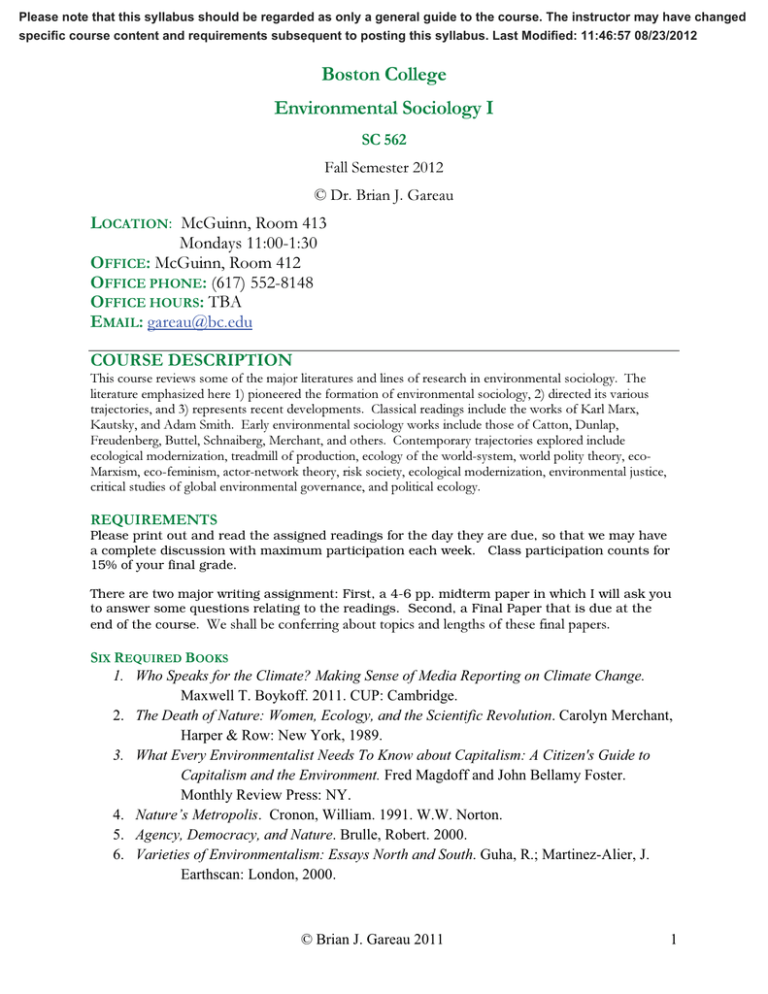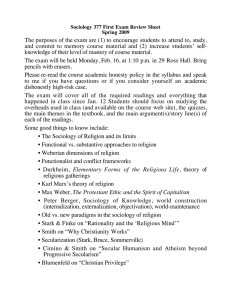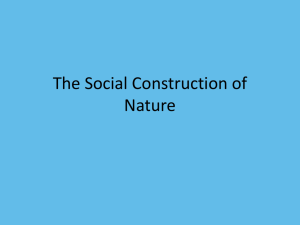Document 11233863
advertisement

Please note that this syllabus should be regarded as only a general guide to the course. The instructor may have changed specific course content and requirements subsequent to posting this syllabus. Last Modified: 11:46:57 08/23/2012 Boston College Environmental Sociology I SC 562 Fall Semester 2012 © Dr. Brian J. Gareau LOCATION: McGuinn, Room 413 Mondays 11:00-1:30 OFFICE: McGuinn, Room 412 OFFICE PHONE: (617) 552-8148 OFFICE HOURS: TBA EMAIL: gareau@bc.edu COURSE DESCRIPTION This course reviews some of the major literatures and lines of research in environmental sociology. The literature emphasized here 1) pioneered the formation of environmental sociology, 2) directed its various trajectories, and 3) represents recent developments. Classical readings include the works of Karl Marx, Kautsky, and Adam Smith. Early environmental sociology works include those of Catton, Dunlap, Freudenberg, Buttel, Schnaiberg, Merchant, and others. Contemporary trajectories explored include ecological modernization, treadmill of production, ecology of the world-system, world polity theory, ecoMarxism, eco-feminism, actor-network theory, risk society, ecological modernization, environmental justice, critical studies of global environmental governance, and political ecology. REQUIREMENTS Please print out and read the assigned readings for the day they are due, so that we may have a complete discussion with maximum participation each week. Class participation counts for 15% of your final grade. There are two major writing assignment: First, a 4-6 pp. midterm paper in which I will ask you to answer some questions relating to the readings. Second, a Final Paper that is due at the end of the course. We shall be conferring about topics and lengths of these final papers. SIX REQUIRED BOOKS 1. Who Speaks for the Climate? Making Sense of Media Reporting on Climate Change. Maxwell T. Boykoff. 2011. CUP: Cambridge. 2. The Death of Nature: Women, Ecology, and the Scientific Revolution. Carolyn Merchant, Harper & Row: New York, 1989. 3. What Every Environmentalist Needs To Know about Capitalism: A Citizen's Guide to Capitalism and the Environment. Fred Magdoff and John Bellamy Foster. Monthly Review Press: NY. 4. Nature’s Metropolis. Cronon, William. 1991. W.W. Norton. 5. Agency, Democracy, and Nature. Brulle, Robert. 2000. 6. Varieties of Environmentalism: Essays North and South. Guha, R.; Martinez-Alier, J. Earthscan: London, 2000. © Brian J. Gareau 2011 1 ELECTRONIC READINGS: Course readings are available to view online, download, and print on Blackboard Vista. ATTENDANCE/PARTICIPATION: SC 562 is a seminar-format class that combines lecture with group discussion. Students’ final grade will depend, in part, on the quality of their participation in class discussion. Obviously, adequate participation requires regular attendance. You must be respectful of other’s viewpoints, experiences, orientation, etc. when discussing the concepts in this class. Debate is inevitable and useful, but be respectful. If you are not, you will be asked to withdraw from the course. Each of you will be expected to keep abreast of the reading, prepare and make presentations on materials during the scheduled sections. We have a good deal of material to cover, so the success of the seminar depends on the active participation of everyone. During the first meeting we shall organize ourselves and generate a schedule of presentations. You must come prepared with a two-page write-up on the day’s reading every class. Make notes, comments, questions, and critiques of the readings. Readings should be studied before the class for which they are assigned. These assignments count for your attendance, and you may not turn them in late or in absentia from the class. These write-ups will make valuable notes for your exams and potential future work on globalization issues. Required readings are, of course, required, and recommended readings are recommended. Depending on your area of specific interest, you might find some of the recommended readings very relevant to your own pursuits. If so, talk to me about making them more central to your course experience and/or writing assignments (including the course paper). All the required and recommended articles are available on Blackboard Vista. If the recommended reading is a book, it is on reserve at O’Neill Library. NOTE: THERE ARE NO unexcused absences permitted during the semester. For each absence, your participation and write-up grades will be lowered (e.g., for example, if we have 10 write-ups due this semester, with one absence you will receive a maximum score of 90% on write-ups and participation). The only "excused" absences are those presented to me in writing (a) by a health care practitioner certifying that you had a sound medical reason to be absent from class (and note that the BC Infirmary does not give out such notes) or (b) by your Dean certifying that you had a serious personal reason to be absent from class. Job interviews do not count as a legitimate absence, but rather a conscious choice you make to miss class. © Brian J. Gareau 2011 2 ASSESSMENT All grades in SC 562 are based on the percentages shown in Table 1. STUDENT RESPONSIBILITIES AND ASSOCIATED GRADES. Students are responsible for the work listed in Table 2. TABLE 2. STUDENT WORK & PERCENTAGE OF GRADE EARNED Midterm Paper 20% Final Paper 25% Team-led Discussion 20% Daily Reading Summaries 20% In-class Participation 15% TABLE 1. GRADE SCALE Letter Grade % Range A 93-100 A- 90-93 B+ 87-90 B 83-87 B- 80-83 C+ 78-80 C 73-78 C- 70-73 D+ 67-70 D 63-67 D- 60-63 F <60 You must come prepared with a one to two-page write-up on the day’s reading every class. General Outline: 1. In the first paragraph, provide the general thread of argument, ideas, concepts, and/or themes that run through the readings for the week. 2. In the body of the paper, discuss in detail some of the key concepts and arguments. Discuss the readings in an integrative way; put the current readings in conversation with previous readings. Dig deep into the readings; do not provide a superficial summary. Rather, engage with the reading by giving a critical review of what you choose to focus on. 3. Then, give your view on some of these concepts. Which concepts/arguments make sense to you? Which do not? Use readings from previous weeks to support your claims. 4. This assignment will take some time to master, but it is a valuable skill, so work hard at it. Students are also required to lead the discussion with a 10-15 minute formal presentation several times throughout the course. © Brian J. Gareau 2011 3 ORGANIZATION OF THE CLASS BY WEEK WEEK ONE: Monday 3 September LABOR DAY; NO CLASSES WEEK TWO: Monday 10 September Theme: Course overview: Syllabus, readings, assignments, and expectations. Assign seminar leaders. WEEK THREE: MONDAY 17 Overview of the field and Origins of Environmental Sociology 1. Buttel, Frederick H. 1987. “New Directions in Environmental Sociology.” Annual Review of Sociology 2. Dunlap, Riley E. and William R. Catton Jr. 1979 “Environmental Sociology” Annual Review of Sociology 3. Dunlap, Riley and William R. Catton, Jr 1994. “Struggling with Human Exceptionalism: The Rise, Decline and Revitalization of Environmental Sociology” The American Sociologist 4. Dunlap, Riley E. and Eugene A. Rosa. 2000 “Environmental Sociology” in EF Borgatta and RJV Montgomery (eds) The Encyclopedia of Sociology 800-813. Recommended: 1. Kautsky, K., The agrarian question. Zwan Publications: London, 1988 [1899] 2. Chaëiìanov, A.V., The theory of peasant economy. In Rhorner, D.; Kerblay, B.H.; Smith, R.E.F., Eds. R. D. Irwin: Homewood, Illinois, 1966 3. Marx, K., Capital, vol. I. In The marx-engels reader, Second ed.; Tucker, R.C., Ed. W.W. Norton & Company: New York, 1978 [1867]; pp 294-438. Seminar Leaders: ________________________________________________________ WEEK FOUR: Monday 24 September Paradigmatic Perspectives in Environmental Sociology 1. Buttel, Frederick H. 1978. “Environmental Sociology: A New Paradigm?” The American Sociologist 13 2. Catton, William R. and Riley E. Dunlap. 1978. “Environmental Sociology: A New Paradigm” The American Sociologist 13 3. Catton, William R. and Riley E. Dunlap. 1978. “Paradigms, Theories and the Primacy of the HEP-NEP Distinction” The American Sociologist 13 4. Benton, Ted. 1991. “Biology and Social Science: Why the Return of the Repressed Should be Given a (Cautious) Welcome” Sociology 25 Seminar Leaders: ________________________________________________________ © Brian J. Gareau 2011 4 WEEK FIVE: MONDAY 1 OCTOBER Classical Theoretical Perspectives in Environmental Sociology 1. Foster, John Bellamy. 1999. “Marx’s Theory of Metabolic Rift: Classical Foundations for Environmental Sociology.” American Journal of Sociology 2. Sunderlin, William D. 1995. “Managerialism and the Conceptual Limits of Sustainable Development” Society and Natural Resources 3. Foster, John Bellamy, and Hannah Holleman. 20120. Weber and the Environment: Classical Foundations for a Postexemptionalist Sociology. American Journal of Sociology 117(6): 16-40. 4. Buttel, Frederick H. 2000. “Classical Theory and Contemporary Environmental Sociology” in G. Spaargaren and A. Mol and FH Buttel (eds) Environment and Global Modernity Recommended: 1. Redclift, Michael and Graham Woodgate. 1994 “Sociology and the Environment: Discordant Discourse?” Pp. 51-66 in M. Redclift and G. Woodgate (eds) Social Theory and the Global Environment 2. Benton, Ted. 1989. “Marxism and Natural Limits.” New Left Review 178:51-86. 3. Smith, A., The Wealth of Nations. Everyman's Library Edition ed.; Knopf: New York, 1991 [1776]. 4. Kautsky, K., The Agrarian Question. Zwan Publications: London, 1988 [1899] Seminar Leaders:____________________________________________________ WEEK SIX: Monday 8 October COLUMBUS DAY NO CLASSES MIDTERM PAPER GUIDELINES EMAILED THIS WEEK TO THE CLASS © Brian J. Gareau 2011 5 WEEK SEVEN: Monday 15 October Contemporary Theoretical Perspectives I: The Risk Society vs. Ecological Modernization 1. Buttel, Frederick H. 2000. "Ecological Modernization as Social Theory." Geoforum 31:57-65. or 2. Mol , Arthur P. J. and Gert Spaargaren. 2000. "Ecological Modernization Theory in Debate: A Review," Environmental Politics 9:17-49. and 3. Beck, Ulrich. 1992. “From Industrial Society to Risk Society: Questions of Survival, Social Structure and Ecological Enlightenment” Theory, Culture and Society 9 4. Mol and Spaaragaren. 1993. “Environment, Modernity and the Risk-Society: The Apocalyptic Horizon of Environmental Reform” International Sociology 8 or 5. Cohen, Maurie. 1997. “Risk Society and Ecological Modernization: Alternative Visions for Post-Industrial Nations” Futures 2 and 6. Bunker, Stephen G. 1996. “Raw Material and the Global Economy: Oversights and Distortions in Industrial Ecology” Society and Natural Resources 9 or 7. Bonds, Eric and L. Downey“Green” Technology and Ecologically Unequal Exchange: The Environmental and Social Consequences of Ecological Modernization in the World-System. Journal of World-Systems Research. 12 (2) Seminar Leaders: ________________________________________________________ © Brian J. Gareau 2011 6 WEEK EIGHT: Monday 22 October MIDTERM PAPER DUE Contemporary Theoretical Perspectives II: Treadmill of Production, World-Systems Theory, and Socio-Structural Perspectives 1. Barbosa, Luiz C. 1993. “The ‘Greening’ of the Ecopolitics of the World-System: Amazonia and Changes in the Ecopolitics of Brazil” Journal of Political and Military Sociology 21:107-134. 2. O’Connor, James. 1994. “Is Sustainable Capitalism Possible?” in Martin O’Connor (ed) Is Capitalism Sustainable? Political Economy and the Politics of Ecology 3. Schnaiberg, Allen. (1994). The political economy of environmental problems and policies. Advances in Human Ecology 3:23-64. 4. Bunker, S.G., Modes of extraction, unequal exchange, and the progressive underdevelopment of an extreme periphery: The Brazilian Amazon, 1600-1980. American Journal of Sociology 1984, 89, 1017-1064. and 5. Jorgenson, Andrew (2009). The Transnational Organization of Production, the Scale of Degradation, and Ecoefficiency: A Study of Carbon Dioxide Emissions in Less-Developed Countries. Human Ecology Review. 16(1): 64-74. or 6. Jorgenson, Andrew and Bret Clark. 20120. “Are the Economy and the Environment Decoupling? A Comparative International Study, 1960–2005” American Journal of Sociology. Vol. 118, No. 1:1-44. or 7. Beckfield, Jason. 2003. Inequality in the World Polity: The Structure of International Organization. American Sociological Review. 68: 401-424. Recommended: 1. Gareau, Brian J. 2012. “Theorizing Environmental Governance of the World System: Global Political Economy Theory and Some Applications to Stratospheric Ozone Politics.” Journal of World-Systems Research. 12(2): 187-210. 2. Smith, David A. 1994. “Uneven Development and the Environment: Notes on a WorldSystem Perspective” Humboldt Journal of Social Relations 20 WEEK NINE: 29 OCTOBER Societal-Environmental Interactions II: Constructivist Approaches and Controversies 1. Freudenburg, William R., Scott Frickel and Robert Gramling (1995). Beyond the nature/society divide: Learning to think about a mountain. Sociological Forum 10(3): 361392. 2. Murphy, Raymond. 1995. Sociology as if Nature Did Not Matter: An Ecological Critique. British Journal of Sociology. 46:688-707 3. Greider, Thomas and Lorraine Garkovich. 1994. “Landscapes: The Social Construction of Nature and the Environment” Rural Sociology 59 4. Freudenburg, William and Robert Gramling. 1993. “Socioenvironmental Factors and Development Policy: Understanding Opposition and Support for Offshore Oil Development” Sociological Forum 8 Seminar Leaders: ________________________________________________________ © Brian J. Gareau 2011 7 WEEK TEN: 5 November Case Study I: Climate Change Who Speaks for the Climate? Making Sense of Media Reporting on Climate Change Maxwell T. Boykoff. 2011. Cambridge. Recommended: • Boykoff, Max and Jules Boykoff (2004) Balance as Bias: Global Warming and the US Prestige Press. Global Environmental Change. 14: 125-136. • York, Richard (2008). De-Carbonization in Former Soviet Republics, 1992-2000: The Ecological Consequences of De-Modernization. Social Problems. 55(3) 370-390. Seminar Leaders: ________________________________________________________ WEEK ELEVEN: Monday 12 November Case Study II: Environmental history Cronon, William. Nature’s Metropolis. 1991. W.W. Norton. Recommended: • Mann, C. Chapter 1, “A View from Above,” and Chapter 6, “Cotton and Maize” In 1491 • Cronon, W., The trouble with wilderness; or, getting back to the wrong nature. In Uncommon ground: Toward reinventing nature, Cronon, W., Ed. W.W. Norton & Company: New York, 1995. • Slater, C., Amazonia as edenic narrative. In Uncommon ground: Toward reinventing nature, Cronon, W., Ed. W.W. Norton & Company: New York, 1995; pp 114-131. Cronon, W., Changes in the land: Indians, colonists, and the ecology of new england. Hill and Wang: New York, 2003. • Seminar Leaders: ________________________________________________________ © Brian J. Gareau 2011 8 WEEK TWELVE: Monday 19 November Case Study III: Eco-Feminism and Environmental History 1. Merchant, C., The Death of Nature : Women, Ecology, and the Scientific Revolution. Harper & Row: New York, 1989 Recommended • (Vista) Thompson, W.R. Climate, Water, and Political-Economic Crises in Ancient Mesopotamia and Egypt. Chapter 11, In Horrnborg and Crumley (eds) The World System and the Earth System: Global Socioenvironmental Change and Sustainability Since the Neolithic. Seminar Leaders: ________________________________________________________ WEEK THIRTEEN: Monday 26 November Case Study IV: Global Political Ecology: Environmentalism for the Whole World 1. Varieties of Environmentalism: Essays North and South. Guha, R.; Martinez-Alier, J. Earthscan: London, 2000. Recommended: 1. Gareau, B.J. Definitions of “Ecological Imperialism” and “Domination of Nature” 2. Moore, J. Silver, Ecology, and the Origins of the Modern World Chapter 6, In Hornborg, McNeill and Martinez-Alier (eds) Rethinking Environmental History 3. Stonich, S.C., I am destroying the land!: The political ecology of poverty and environmental destruction in Honduras. Westview Press: San Francisco, 1993. 4. Swyngedouw, E.; Heynen, N.C., Urban political ecology, justice and the politics of scale. Antipode 2003, 35, 898-918. 5. Walker, P.A., Reconsidering 'regional' political ecologies: Toward a political ecology of the rural West. Progress in Human Geography 2003, 27, 7-21. 6. Gareau, B.J., Dangerous holes in global environmental governance: The roles of neoliberal discourse, science, and California agriculture in the Montreal Protocol. Antipode 2008, 40, 102-130. 7. Gareau, B.J. 2007. “Ecological Values amid Local Interests: Natural Resource Conservation and Human Survival in Southern Honduras. Rural Sociology. Seminar Leaders: ________________________________________________________ © Brian J. Gareau 2011 9 WEEK FOURTEEN: Monday 3 December Rethinking Society-Environment Relations: A Call for Socionatural Relations (Or, back to NEP? Whatever happened to the new ecological paradigm?) 1. What Every Environmentalist Needs To Know about Capitalism: A Citizen's Guide to Capitalism and the Environment. Fred Magdoff and John Bellamy Foster. Monthly Review Press: NY. 2. Callon, M., Some Elements of a Sociology of Translation: Domestication of the Scallops and the Fisherman of St. Brieuc Bay. In Power, Action and Belief: A New Sociology of Knowledge, Law, J., Ed. 1986. And 3. Castree, N., False antitheses? Marxism, nature and actor-networks. Antipode 2002, 34, 111146. Or 4. Gareau, B.J., We have never been ‘human’: Agential nature, ANT, and marxist political ecology. Capitalism, Nature, Socialism 2005, 16, 128-140. Or 5. Gareau, B.J., Class consciousness or natural consciousness? Socionatural relations and the potential for social change: Suggestions from development in southern honduras. Rethinking Marxism 2008, 20, 120-141. Or 6. Perkins, H., Ecologies of actor-networks and (non)social labor within the urban political economies of nature Geoforum 2007, 38, 1152-1162. Recommended: 1. McDonough, W. and M. Braungart. 2002. Cradle to Cradle: Remaking the Way We Make Things. North Point Press. Seminar Leaders: ________________________________________________________ © Brian J. Gareau 2011 10 WEEK FIFTEEN: MONDAY 10 DECEMBER Environmental Justice 1. 2000. Brulle, Robert. Agency, Democracy, and Nature. MIT Press. Recommended 1. 2. 3. 4. 5. 6. Okereke, C., Global justice and neoliberal environmental governance : Ethics, sustainable development and international co-operation. Routledge: London, 2008; p viii, 233 p. Szasz, A., Ecopopulism: Toxic waste and the movement for environmental justice. University of Minnesota Press: Minneapolis, 1994. Faber, D., Capitalizing on environmental injustice: The polluter-industrial complex in the age of globalization. Rowman & Littlefield Publishers: Lanham, 2008 Gould, K.A.; Pellow, D.; Schnaiberg, A., Interrogating the treadmill of production: Everything you wanted to know about the treadmill but were afraid to ask. Organization and Environment 2004, 17, 296-316. Bullard, R. (ed) 2007. Growing Smarter: Achieving Livable Communities, Environmental Justice, and Regional Equity. MIT Press. Haraway, D., Situated knowledges: The science question in feminism and the privilege of partial perspective. In Simians, cyborgs, and women: The reinvention of nature, Haraway, D., Ed. Routledge: New York, 1991 Seminar Leaders: ________________________________________________________ FINAL PAPER DUE AT DAY AND TIME NOTED IN THE BC SCHEDULE OF EXAMS © Brian J. Gareau 2011 11








